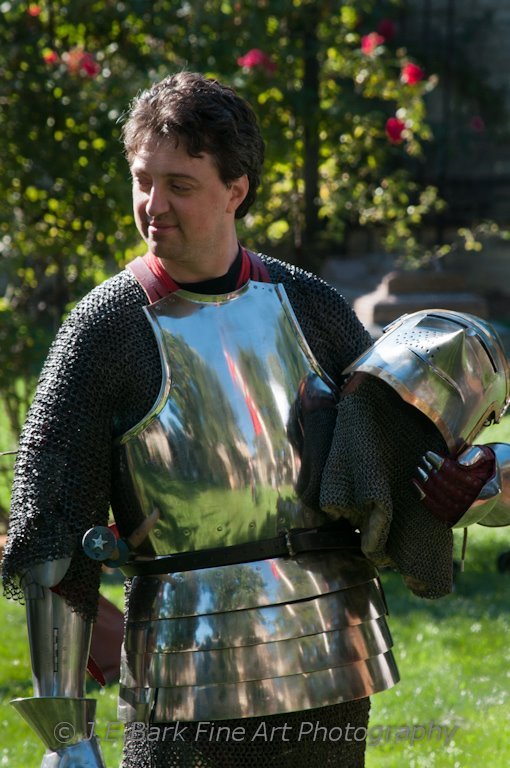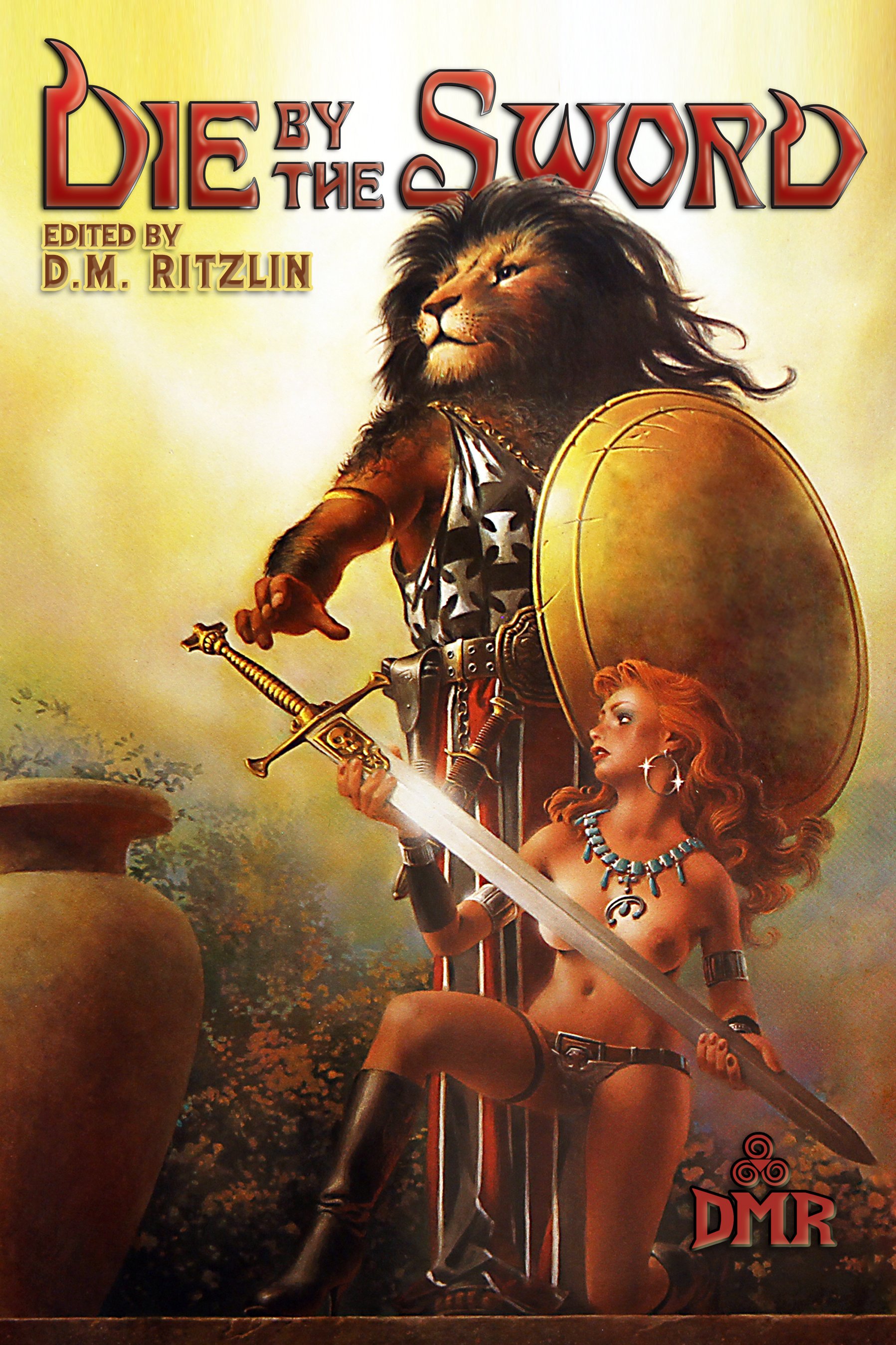Independent Author Spotlight: Gregory D. Mele
Please introduce yourself and tell us about your background as a writer.
I'm a Chicago native with a background in journalism and medieval history, whose life has pretty much revolved around swords...sorcery, not so much.
Like many you interview, I've had a passion for sword & sorcery and historical fiction for most of my life. Growing up in Chicago in the early 80s, I remember WGN every Sunday showed "Family Classics" and my Dad and I would watch them together. While plenty of those were things like Lassie there was also a steady offering of swashbucklers from Adventures of Robin Hood and Zorro to Black Shield of Falsworth and The Vikings. My Dad was in his mid-40s when I was born and had grown up reading Dumas and Sabatini, Zane Grey's Westerns and so forth, and so I was reading swashbucklers and westerns by the time I was ten. Conversely, our next-door neighbor was a Vietnam Vet who'd basically kept himself sane during the war reading the 60s editions of Conan, and he gave me his entire Lancer collection when I turned 13 and that was that!
From this point, I think my bio aligns with most GenX fantasy writers: ours was the generation that dwelt "Between the Years when Ace reprinted Kull of Atlantis and the Rise of Big Fat Fantasy" and it sort of was an “Age Undreamed of.” There was a lot of epic fantasy by Tolkien, Brooks, Donaldson and Feist, but the shelves were also full of books by Lin Carter, Tanith Lee, Andrew Offut, Robert Vardeman, and David C. Smith (who wrote both great sword & sorcery at that time AND epic fantasy in The Fall of the First World). D&D, Runequest and Call of Cthulhu were the forefront of RPGs and although most fantasy films sucked (anyone remember Ator the Fighting Eagle?) there was also Conan the Barbarian, Sword & the Sorcerer (aka 'This is TOTALLY not 'Hour of the Dragon' so don't sue us.'), Beastmaster and Fire and Ice. It was a great time to be a nerd, even if fantasy was decidedly not cool as it is now.
Basically, from Elric to Aragorn, Captain Blood to King Arthur, if there were swords being swung, I was probably reading it, and if there was an RPG I was probably playing it -- although I mostly wanted to run the games so I could design cool settings. I always wanted to be a writer, so I pursued a journalism degree as one of my two majors at the University of Illinois at Urbana-Champaign, but I spent more time working in marketing and tech-writing than I did as a journalist.
Where my bio makes a left turn is in the realm of martial arts. I always wanted to know 'how knight's fought,' even though I was growing up more in the heart of the 'ninja craze'. I did the obligatory fencing and kendo, historical reenactment, etc., along with aikido and jujutsu. But in college I discovered that there were dozens of historical fencing manuscripts left by actual professional fighters and fencing masters during the 1400s and 1500s and my course was set. My paternal family is Italian, and I can read the language, so I focused on those texts. Since the late 90s, my passion has been the reconstruction and preservation of armizare, a martial art developed over 600 years ago by the famed Italian master-at-arms Fiore dei Liberi, that includes the use of the two-handed sword, spear, dagger, wrestling, poleaxe and armoured combat (for the curious, see http://www.armizare.org) In 1999, I founded the Chicago Swordplay Guild to study the subject, and in 2010 Freelance Academy Press, a publisher in the fields of martial arts, arms and armour, chivalry, historical arts and crafts.
Sadly, at the time I moved into this realm professionally, my Dad was ill and couldn't really see where those early days of watching Errol Flynn and making wooden swords in the garage had led to, but I'd like to think he knows.
What are the most prominent influences on your writing? How do you incorporate those influences without being derivative?
No one writing in this field can claim that REH isn't an influence -- his shadow is too broad -- but so far the only person I have ever read who can write like him and sound good doing it is Scott Oden. So, knowing that REH is always in the background, like the S&S equivalent to the God of Genesis, I'm going to say that my influences are actually Zelazny, Raymond Chandler, Richard L. Tierney and Charles Saunders. Zelazny's gift for ironic, witty dialogue is second to none, and Corwin of Amber is one of the greatest characters ever. But just as there would likely be no Howard without Jack London and Harold Lamb, there'd have been no Zelazny without Raymond Chandler, who could do more in a sentence than some authors do in a page. Dick Tierney was simply the best Howardian author there was without trying to be Howard and he could integrate Lovecraft's Mythos into a heroic setting better than anyone; whereas Saunders was the guy who showed me that sword & sorcery could have deep emotional depth and work in any setting. If Howard, Zelazny and Chandler were like a pantheon of deities for me, Tierney and Saunders were the more contemporary demigods whose work I read and felt inspired to emulate. Sadly, we lost both recently, and although I had the opportunity to eulogize both at Black Gate, I missed the chance to meet either.
I also need to mention the Winter of the World novels by the late Michael Scott Rohan, whom I did correspond with briefly, and whose work has a deep and sweeping impact on my Azatlán saga, even though his influences were all Norse, Celtic and Finnish and mine are Mesoamerican and Mycenean.
Finally, if you were to ask me whom I would most want to write like, it would have to be Richard Matheson and Graham Greene, but I know my place on the literary food chain!
With self-publishing easier than ever, there are tons of books being released every day. What makes your work stand out from the crowd? What can readers get out of your work that they can’t from anyone else?
In Azatlan, I've tried to create a world that you won't find somewhere else and to open a window onto cultures radically different from our own. I also bring the kind of complex world-building associated with epic fantasy to the style of faster-paced fantasy one found in Weird Tales: “blood & thunder” sword & sorcery (my cycle of stories about Sarrumos the Sailor), dark-creepy CAS-style weird fiction (the stories involving Sipan, High Priest of Lord Death), and the occult-detective (the stories of Khalkeos and Ometl I am writing for Tales from the Magician's Skull). Each of those story-cycles take place in the same world, and have overlapping references and timelines, but they are all written in very different tones, use different point of view narration, etc.
(As an aside, “Heart of Vengeance”, appearing in the new DMR collection Die By the Sword, is one of the Sipan tales, although he appears as a minor figure.)
Many authors say marketing is one of their biggest challenges. What tactics have you found to be most effective for getting your name out there?
Alas, I am the wrong person to ask because right now I've only been publishing short stories in other's publications, and confess, I still find the world of fiction to be as comprehensible and navigable as the churning storms of Chaos in a Moorcock novel.
How much do your audience’s expectations factor in to what you write? Does this ever cause you to hold back from experimenting?
As this is purely avocational right now, I write what I want to write and hope it finds a home! I try to be conscious of some changes in taste over the years -- how we use the term 'race' and why, calling grown women 'girls' and so forth. (I've no patience for either editing or 'canceling' the dead for daring not to hold the positions or political fashions of the current day, but I DO think it is one thing for Howard to have expressed a casual racism in his writing that would not have quirked an eyebrow anywhere in 1930, and to use that as justification to do the same in 2023.). But otherwise no. A dozen or so stories in, I'm still honing my craft and if a story falls flat but I learned from it, then so be it.
Have you had any new stories published recently? Are you currently working on any?
Publishing is painfully slow, so I am in a weird position of having two Sipan stories originally written for Heroic Fantasy Quarterly now being reprinted this year in your Die by the Sword, and Rogue Blades' recent We Who Are About to Die while waiting for three pieces I sold over a year ago to see print. Look to see Sarrumos' origin story in issue 12 (I think) of Tales from the Magician's Skull and the second Khalekos and Ometl story in the issue that follows. I have another Sarrumos story ("Jaguar's Children") that I sold to Rogue Blades for an anthology that it sounds like may no longer see light of day, so we'll see what happens with that, and an Azatlán novel that is being shopped around right now.
Other than that, I have two more Sarrumos stories completed, an idea for another Khalekos and Ometl tale, another situated in a world inspired by the late Babylonian Empire and a novella (?) that takes just after the Black Death in an alternate timeline. We'll see if it makes it across the finishline.
Name one newer and one older book you have read and enjoyed recently. (“Newer” meaning from the past year or so, and “older” meaning written before 1980.)
Newer: Ordinary Monsters by J.M. Miro was hands-down the best book I read last year. It's something like a creepy Victorian penny dreadful that could be as inspired by X-Men as it is Dracula and is a rare book that justifies every one of its 600 pages. For older, I am going to cheat slightly, and say Cyrion, by Tanith Lee. (Cheat because it was printed in '82 but most of the pieces in it are older). Lee is in top form here with her finely honed, lush prose, submersing one in a familial mystery of murder and revenge in a decadent yet putrescent setting with a strangely compelling mixture of vile villainy, malevolent sorcery and the supernatural. And it wouldn't be Lee without at least a serving or two of depravity to boot.
Any final words?
I think the industry is in flux and would not pretend to know where it will shake out, but whether or not the upsurge we are seeing in what was once called 'weird fiction' ever becomes marketable, much as the fanzines that respawned that industry in the early 60s, I think the parallel industry of small press, and the potential of print on demand and digital media to keep books perpetually in print at least means that such fiction will always have some sort of home. And that is encouraging, indeed.


